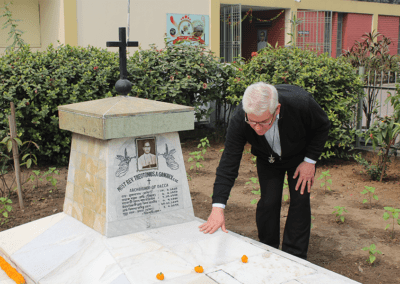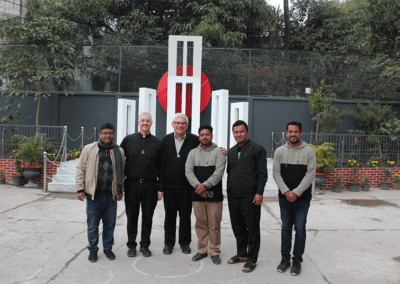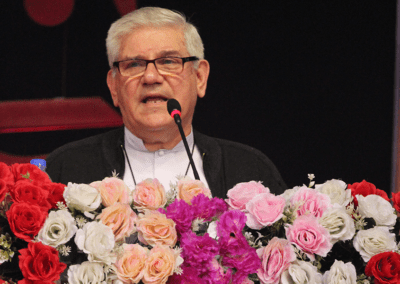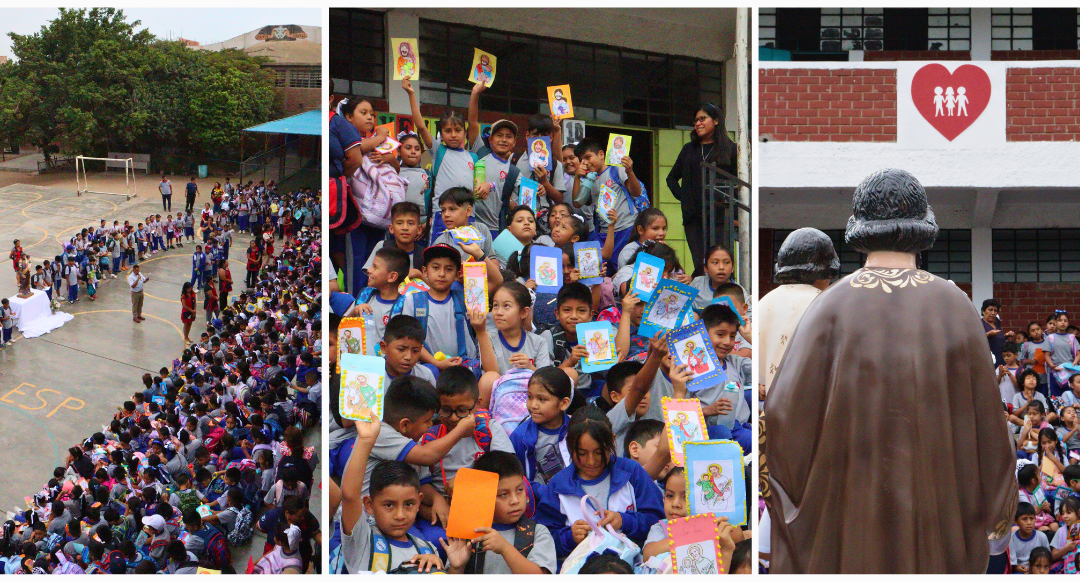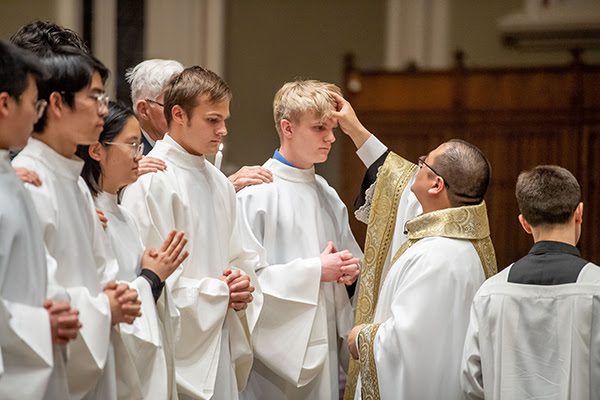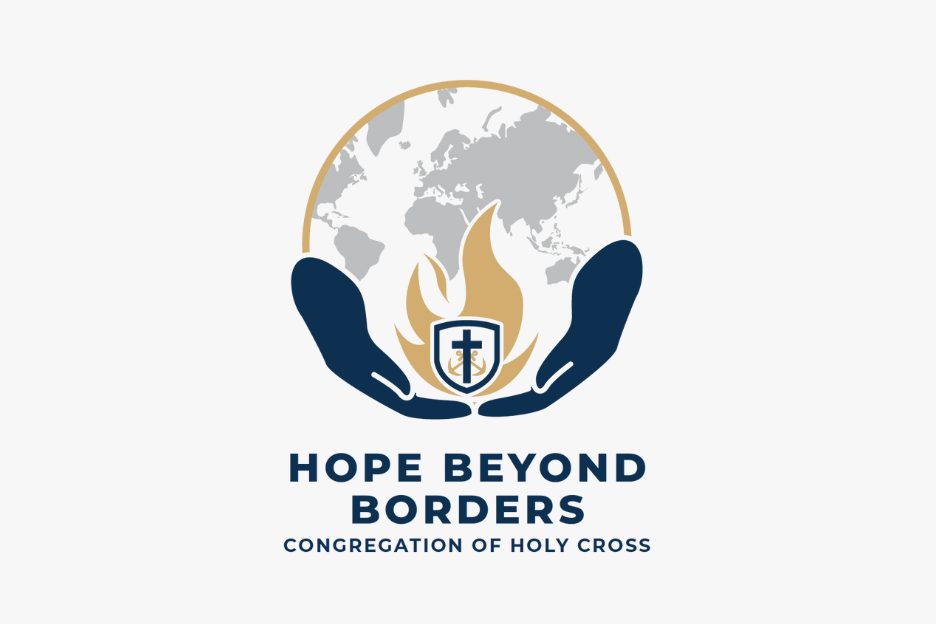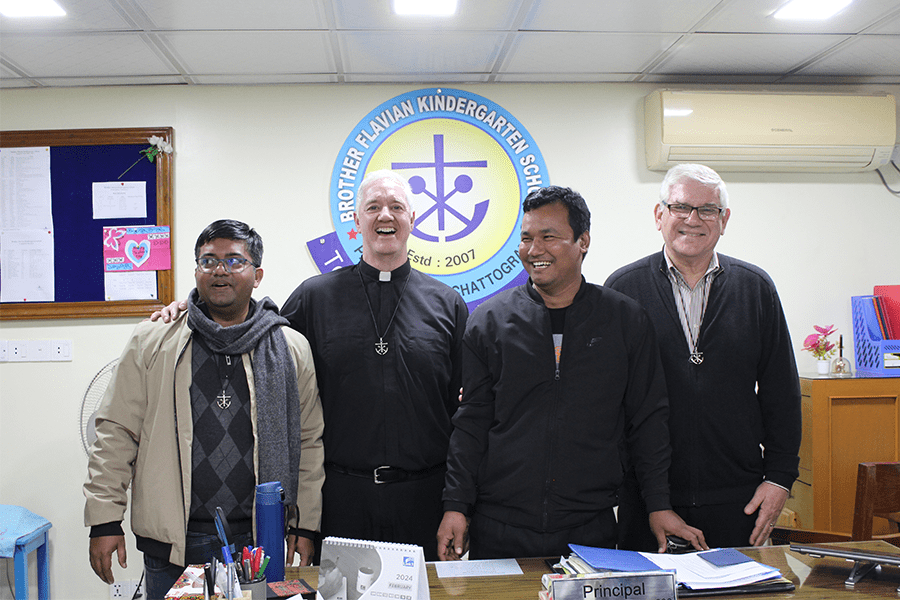
On April 28, 2024, Superior General of the Congregation of Holy Cross Br. Paul Bednarczyk, C.S.C., issued his sixth Circular Letter. Circular Letters are a tradition in the Congregation of Holy Cross dating back to its founding, and they serve as a means by which the Superior General can share his thoughts and priorities with his fellow Holy Cross religious.
Given that this circular letter is titled “Holy Cross Mission: Continuing to Cross New Borders” and is therefore relevant to the work of our office, I would like to share with you some of my takeaways.
1. From its founding, the Congregation of Holy Cross was missionary in nature and vision.
The date of publication for this Circular Letter, April 28, is symbolically significant, for it was on that date in 1840 that founder Blessed Basil Moreau presided over the missioning ceremony of three Holy Cross brothers who were departing for the first overseas mission of the Congregation in Algiers. This occurred just three years after Moreau himself established the Congregation. Thus, this historical event reminds us of the centrality of missionary endeavors to the Congregation’s founder.
2. Jesus Christ’s identity cannot be separated from the fact that he was sent by God the Father. Thus, if we are to “become other Christs,” we too must be sent by the Father.
In a section on “Being Sent,” the Superior General reminds us of Jesus’s understanding of his mission “to bring glad tidings to the poor…to proclaim liberty to captives and recovery of sight to the blind, to let the oppressed go free and to proclaim a year acceptable to the Lord” (Lk 43:18-19). Being sent—commissioned—is therefore integral to the “substance of His entire being,” according to Br. Paul. This identity of Christ is essential to remember when we read Blessed Basil Moreau’s belief that Christians “become other Christs” by nurturing the seed of spiritual life which they receive in Baptism. This begs a question for Holy Cross priests and brothers as well as our readers: How can we nurture within ourselves Christ’s identity as one sent on mission by the Father?
3. Holy Cross religious embark on mission not in a haphazard, “freelance” manner but in union with the Congregation.
Br. Paul shared that in decades past, every CSC in his province knew how life-changing his ministry assignment could be. This realization couldn’t be avoided. Before receiving their new ministry assignments, every CSC had to pack his trunk so that he was ready to leave on a moment’s notice. (See “The Holy Risk of Mission” from May 8, 2023, for more on this dramatic aspect of Holy Cross history). This radical willingness of CSCs to take on any ministry assignment serves as a reminder to Br. Paul that “we are not freelancers doing good works, but that we are missioned and sent by the Congregation to do God’s work in the name of Holy Cross.”
4. We cannot effectively bear witness to Jesus’s life and teachings if we do not know Him intimately.
To reaffirm this point, Br. Paul quotes directly from Blessed Basil Moreau’s 1855 Exercises: “To become a worthy religious of Holy Cross, you must cultivate a habitual union of heart with God….You must be accustomed to a great union of heart with God; now, this union cannot be attained without an increasing fidelity to prayer.”
5. Religious communities like the Congregation of Holy Cross must carry on the legacy of the great saints who have renewed Christian witness throughout the ages: St. Francis of Assisi, St. Catherine of Siena, St. Teresa of Avila, and St. Francis Xavier, among others.
In a subsection titled “Today’s Mission Context,” Br. Paul lays out the dramatic changes that are reshaping the world and challenging faith. With hope, Br. Paul points his fellow CSC to other Catholic religious who have spearheaded spiritual renewal. He does not mince words when talking about St. Francis, St. Catherine, St. Teresa, and St. Francis Xavier: “As consecrated religious, their legacy is our legacy.”
6. Holy Cross priests and brothers point people to spiritual realities by living out their countercultural vows of poverty, chastity, and obedience.
The vows of poverty, chastity, and obedience are quite radical. Seeing vowed religious live them out calls into question the values of secular culture. Br. Paul explains that “If peace, fulfillment, contentment, and joy can be found in a life that is the antithesis of our worldly standards, we offer people a sign of hope that is something deeper to this precious gift of life that is beyond our material world.”
7. Holy Cross religious are called to be prophetic, not in an arrogant or triumphalistic way, but in sharing God’s tender love with the world.
In a few paragraphs on “the prophetic” in our present age, Br. Paul cites important quotes from Pope St. John Paul II and Pope Francis. He then summarizes their insights in his five bullet points for prophetic living:
- To long for God and to know Him through prayer and by listening to the Word;
- To be able to discern good from evil and to discern and to understand God’s will by reading the signs of the times and thus provide creative responses;
- To speak the truth while being beholden to no one but God;
- To be close to the poor and the marginalized; and
- To do all in communion with the Church.
8. The Congregation of Holy Cross will celebrate a Year of Mission from April 28, 2025, until April 28, 2026. You are invited to join us!
In the fall of this year, the Superior General will send four Holy Cross priests and four Holy Cross brothers to Papua New Guinea to establish the new Holy Family Mission. This is a major event in the Congregation’s life for a few reasons. First, for most of the Congregation’s history, it was local Provinces, not the General Administration of the Congregation, that initiated new Missions. Local Provincial Superiors would identify their own members who would staff the new ministries, and their Provinces would financially support the foreign ministries staffed by their members. Today, however, the Papua New Guinea Mission will be overseen directly by the Generalate, a dynamic which has not existed since the 1800s. Second, the Holy Family Mission is significant because it will be initiated by Holy Cross religious from 5 different countries and seven jurisdictions. Never before has such a collaborative effort been undertaken by the Congregation, but it fits with the Superior General’s vision of a more “intercultural” Congregation, a vision that he articulated in his keynote address at our HCMC Centennial Celebration in September 2023.
The start of the new Holy Family Mission is an opportunity for the Congregation’s 1000+ finally professed members around the world, and for lay collaborators like myself, to dwell more deeply on Holy Cross’s missionary history and identity, which is why Br. Paul has designated a Year of Mission to start in April 2025 and last through April 2026. He laid out four goals for the year:
4. To inspire and to encourage our partners in ministry to share more deeply in our mission and charism.
The coming Year of Mission is quite exciting for us at the Holy Cross Mission Center. In the months to come, we will explore ways to celebrate the yearlong event in collaboration with the Congregation’s various ministries and our partners in education and parish life. If you or your organization are interested in partnering with us for the Year of Mission, we invite you to email us at hcmc@holycrossusa.org.
Published: June 4, 2024
Faith Abroad: The Feast of St. Joseph in Chile & Peru
The Feast of Saint Joseph was celebrated with joy and devotion across the District of Chile-Peru, uniting the Congregation of Holy Cross, including...
April 2025 Prayer Intention of the Superior General
All are invited to pray along with Superior General Br. Paul Bednarczyk, C.S.C., this month: For those who will receive the Sacraments of Initiation...
Celebrate With Us! The Year of Mission Begins on April 28, 2025
The Congregation of Holy Cross invites all friends, collaborators, and ministries to join in celebrating a landmark spiritual initiative: the Year...

